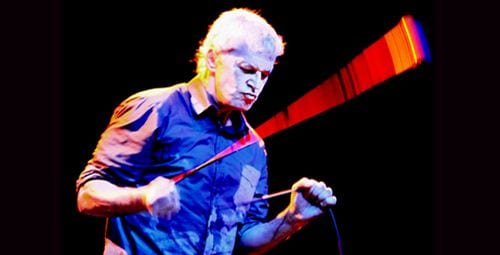
There was a great deal of anticipation at the Riviera Theater as fans awaited the reunited Guided by Voices to take the stage. In fact, the band had initially been booked to play the smaller Vic Theater and tickets for the show sold out so quickly that it was moved to the Riviera Theater. Packed to the brim, the crowd chanted “G-B-V” emphatically while the house music played ill fitting radio friendly pop songs. When the lights dimmed and the red light flashed through the darkness of the backstage area to signify that the band was ready, large cheers were heard. Yet, lead singer Robert Pollard’s odd sense of humor further prolonged the eagerness of devotees by playing a strange vintage track about available language tapes. Fans couldn’t wait for the Club to be Open and experience all the re-occurring fondness for many old classic songs.
By the time Guided by Voices graced the stage, the crowd was more than ready for the two-hour-long set. It wasn’t difficult to see that the primary thing that has made past shows great, Pollard’s quirky personality, continues to permeate the most recent sets with greatness. Undoubtedly, Pollard has a feeling of kinship with the city of Chicago or he wouldn’t have spent his “final” shows with Guided by Voices on New Year’s Eve at the Cabaret Metro in 2004. However, this didn’t keep him from joking around about mixing up venues between here and NYC.
In addition, Pollard made a huge show about finding his old bandmates and introduced his old mates multiple times, expressing his gratitude. He seemed especially comfortable with his old friends, referring to bassist Greg Demos as his “brother” and hugging Sprout. Throughout the set, the majority of the band were very energetic while showing off their rock moves. Pollard’s stage presence took the cake as usual and, though he talked to the audience about how he was a grandpa at his age, he still did his fair share of kicks, mic twirling, and jumps whilst drinking and smoking. Pollard is one of the most prolific songwriters in American history and yet, even in states of immense intoxication, he ever seems to forget any one of his hundreds of thousands of lyrics.
It also takes someone with a teaching background to write lyrics that seem to intelligently touch upon the human essence. At the same time, it’s driven with rock that is at times more classic and at other times quite elusive due to his melancholy and rambling sensibilities. Not surprisingly, there’s a great deal of especially long-time fan appreciation for the rejoining of these key original members. One thing that fans were really treated to was a collection of Tobin Sprout songs from many of the earlier albums which have an undeniable sentimental quality including “A Good Flying Bird”, “Awful Bliss”, and “Gleamer”. This also set the tone for the setlist and led to an exclusion of other songs that didn’t involve Tobin Sprout. Pollard did mention the setlist choices overall directly, stating that he had to acknowledge both the larger songs and the smaller wonders that shouldn’t be left out.
Sprout was the most understated of the group in the sense that he wasn’t jumping and kicking. He modestly did his part and seemed more lovable and real for it. In addition to these tracks, Pollard celebrated many of his older songs by taking lead on such as “I am a Scientist”, “Hot Freaks”, “Game of Pricks”, “Gold Star for Robot Boy”, and “My Valuable Hunting Knife”. Pollard also added the amusing story about recording the vocals to “Hot Freaks” while Sprout was having a garage sale with customers probably wondering what was going on.
There was a grand feeling of shared celebration in the air as audience members clapped for two separate encores featuring songs like “Don’t Stop Now”, “Dodging Invisible Rays”, and finally closing the night with “A Salty Salute”. Overall, many of the later albums of the band’s career (after the lineup had changed to exclude Tobin Sprout) were, of course, left out. A major difference besides his absence was the markedly increased production such as with major label releases 1999’s Do the Collapse and 2001’s Isolation Drills. However, If we all go by the earlier releases emphasized with the reunion setlist such as Propeller (1992) Bee Thousand (1994) and Alien Lanes (1995), it seems like something would actually be lost vs. gained with excess production. If it isn’t lo fi, it isn’t genuine.

![Call for Papers: All Things Reconsidered [MUSIC] May-August 2024](https://www.popmatters.com/wp-content/uploads/2024/04/all-things-reconsidered-call-music-may-2024-720x380.jpg)



